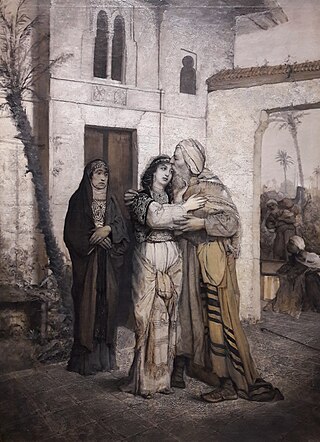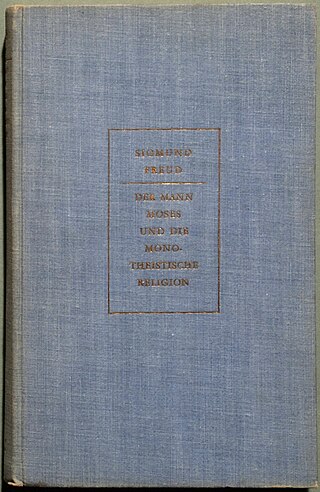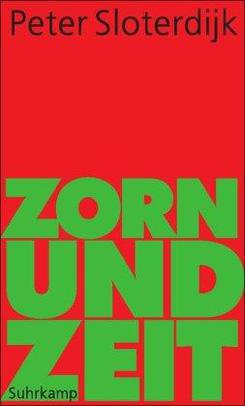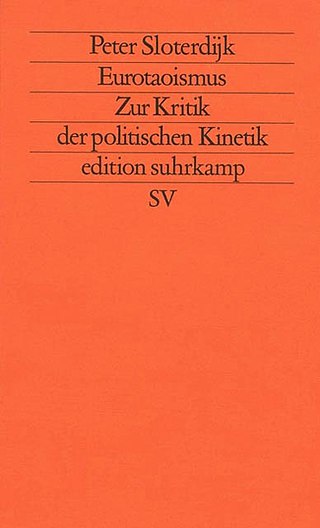Henotheism is the worship of a single, supreme god that does not deny the existence or possible existence of other deities that may be worshipped. Friedrich Schelling (1775–1854) coined the word, and Friedrich Welcker (1784–1868) used it to depict primitive monotheism among ancient Greeks.
Monotheism is the belief that one god is the only, or at least the dominant deity. A distinction may be made between exclusive monotheism, in which the one God is a singular existence, and both inclusive and pluriform monotheism, in which multiple gods or godly forms are recognized, but each are postulated as extensions of the same God.
This is an index page of Wikipedia articles related to the topic of religion.

Peter Sloterdijk is a German philosopher and cultural theorist. He is a professor of philosophy and media theory at the University of Art and Design Karlsruhe. He co-hosted the German television show Das Philosophische Quartett from 2002 until 2012.
In Islam, the terms ḥanīf and ḥunafā' are primarily used to refer to pre-Islamic Arabians who were Abrahamic monotheists. These people are regarded in a favourable light for shunning Arabian polytheism and solely worshipping the God of Abraham, thus setting themselves apart from what is known as jahiliyyah. However, it is emphasized that they were not associated with Judaism or Christianity—and instead adhered to a unique monotheistic faith that exemplified the unaltered beliefs and morals of Abraham. The word is found twelve times in the Quran: ten times in the singular form and twice in the plural form. According to Muslim tradition, Muhammad himself was a ḥanīf and a direct descendant of Abraham's eldest son Ishmael. Likewise, all Islamic prophets and messengers before Muhammad—that is, those affiliated with Judaism and/or Christianity, such as Moses and Jesus—are classified as ḥunafā' to underscore their God-given infallibility.

Nathan the Wise is a play by Gotthold Ephraim Lessing from 1779. It is a fervent plea for religious tolerance. It was never performed during Lessing's lifetime and was first performed in 1783 at the Döbbelinsches Theater in Berlin.

Moses and Monotheism is a 1939 book about the origins of monotheism written by Sigmund Freud, the founder of psychoanalysis. It is Freud's final original work and it was completed in the summer of 1939 when Freud was, effectively speaking, already "writing from his death-bed." It appeared in English translation the same year.
Monotheism—the belief that there is only one deity—is the focus of the Abrahamic religions, which like-mindedly conceive God as the all-powerful and all-knowing deity from whom Abraham received a divine revelation, according to their respective narratives. The most prominent Abrahamic religions are Judaism, Christianity, and Islam. They, alongside Samaritanism, Druzism, the Baháʼí Faith, and Rastafari, all share a common core foundation in the form of worshipping Abraham's God, who is identified as Yahweh in Hebrew and called Allah in Arabic. Likewise, the Abrahamic religions share similar features distinguishing them from other categories of religions:

Christian Heinrich Arthur Drews was a German writer, historian, philosopher, and important representative of German monist thought. He was born in Uetersen, Holstein, in present-day Germany.

In Judaism, God has been conceived in a variety of ways. Traditionally, Judaism holds that Yahweh—that is, the god of Abraham, Isaac and Jacob, and the national god of the Israelites—delivered them from slavery in Egypt, and gave them the Law of Moses at Mount Sinai as described in the Torah. Jews traditionally believe in a monotheistic conception of God, characterized by both transcendence and immanence.
The Abrahamic religions are a grouping of three of the major religions together due to their historical coexistence and competition; it refers to Abraham, a figure mentioned in the Hebrew Bible, the Christian Bible, and the Quran respectively, and is used to show similarities between these religions and put them in contrast to Indian religions, Iranian religions, and the East Asian religions. Furthermore, some religions categorized as "Abrahamic" also share elements from other categories, such as Indian religions, or for example, Islam with Eastern religions.
Polytheism is the belief in or worship of more than one god. According to Oxford Reference, it is not easy to count gods, and so not always obvious whether an apparently polytheistic religion, such as Chinese Folk Religions, is really so, or whether the apparent different objects of worship are to be thought of as manifestations of a singular divinity. Polytheistic belief is usually assembled into a pantheon of gods and goddesses, along with their own religious sects and rituals. Polytheism is a type of theism. Within theism, it contrasts with monotheism, the belief in a singular God who is, in most cases, transcendent.

The most widespread belief among archeological and historical scholars is that the origins of Judaism lie in Bronze Age polytheistic Canaanite religion. Judaism also syncretized elements of other Semitic religions such as Babylonian religion, which is reflected in the early prophetic books of the Tanakh.

The phrase false god is a derogatory term used in Abrahamic religions to indicate cult images or deities of non-Abrahamic Pagan religions, as well as other competing entities or objects to which particular importance is attributed. Conversely, followers of animistic and polytheistic religions may regard the gods of various monotheistic religions as "false gods", because they do not believe that any real deity possesses the properties ascribed by monotheists to their sole deity. Atheists, who do not believe in any deities, do not usually use the term false god even though that would encompass all deities from the atheist viewpoint. Usage of this term is generally limited to theists, who choose to worship some deity or deities, but not others.
Hermann Karl Lenz was a German writer of poetry, stories, and novels. A major part of his work is a series of nine semi-autobiographical novels centring on his alter ego "Eugen Rapp", a cycle that is also known as the Schwäbische Chronik.

Johann Christoph "Jan" Assmann was a German Egyptologist, cultural historian, and religion scholar.

Rage and Time: A Psychopolitical Investigation is a 2006 book by the German philosopher Peter Sloterdijk. It traces the role and prevalence of rage in Western history, starting with the Thumos described by Homer in the Iliad. Sloterdijk argues that a productive form of rage has been suppressed by first Christianity and then psychoanalysis.

Making the Heavens Speak: Religion as Poetry is a 2020 book by the German philosopher Peter Sloterdijk.
This is a bibliography of literature treating the topic of criticism of Judaism as a religion, sorted by alphabetical order of titles.

Infinite Mobilization is a 1989 book by the German philosopher Peter Sloterdijk. It critiques modernity as a conception of kinetics that inevitably leads to disappointment, and promotes a view of life as a series of beginnings.











